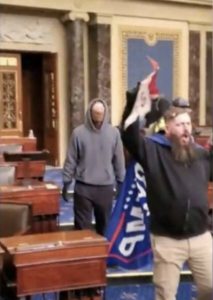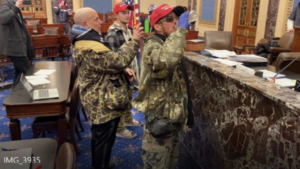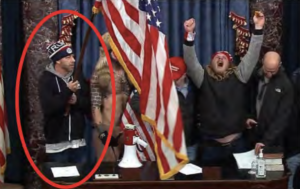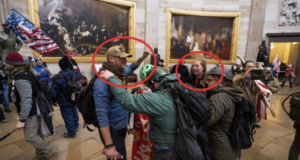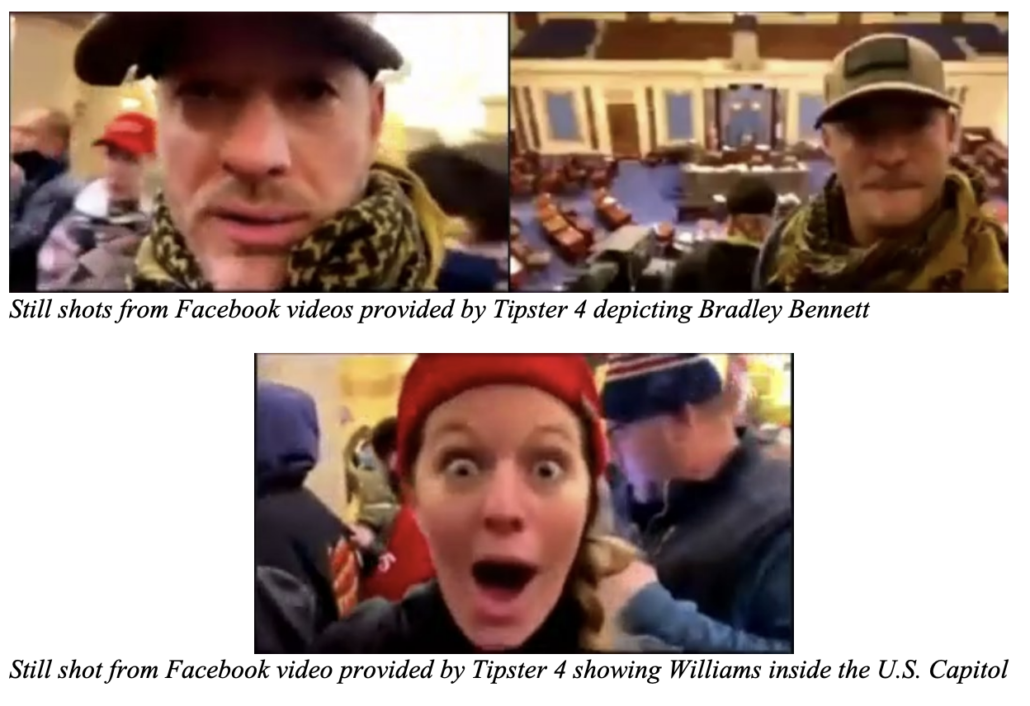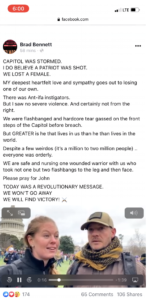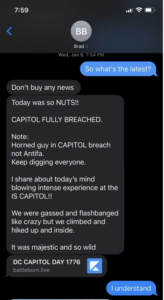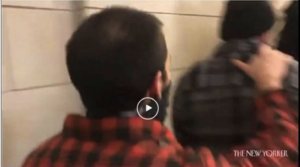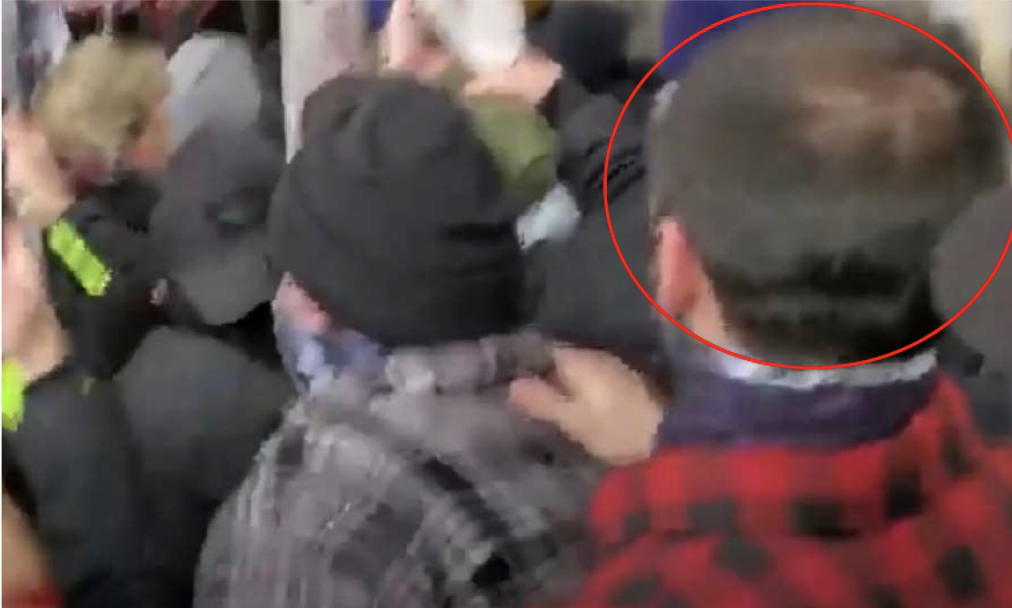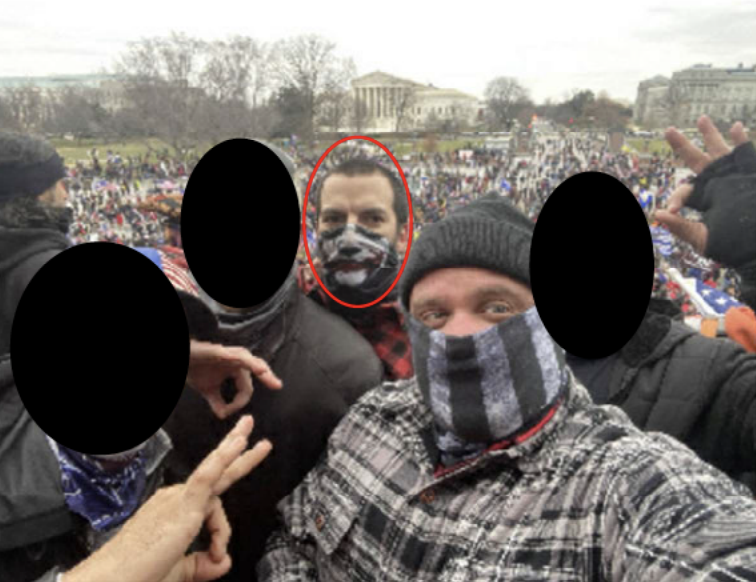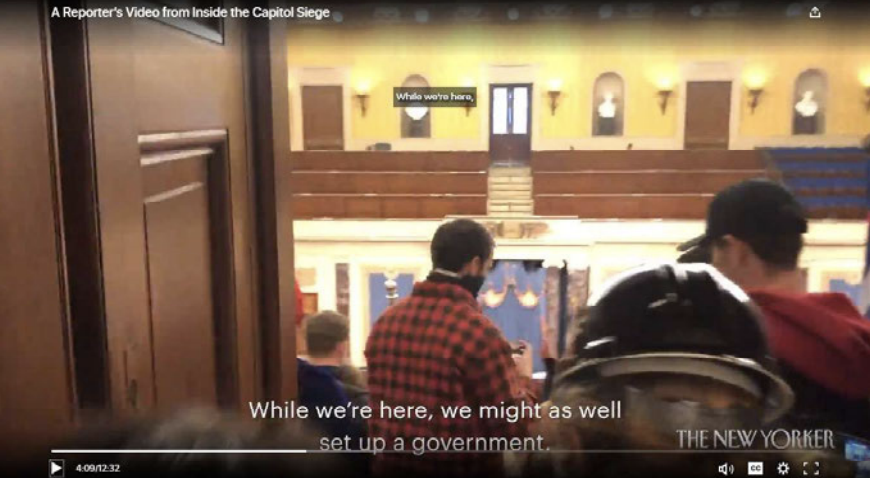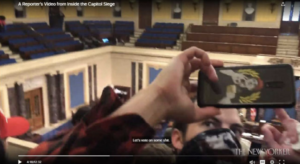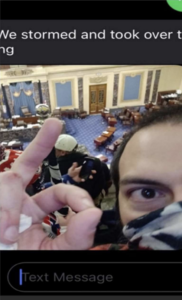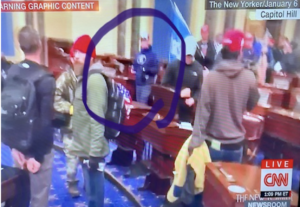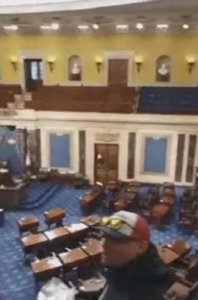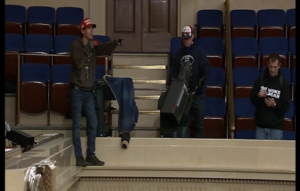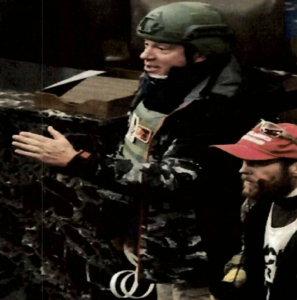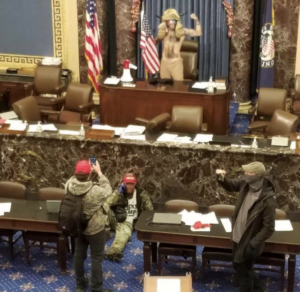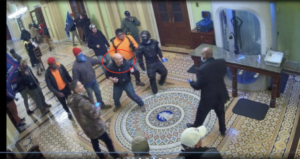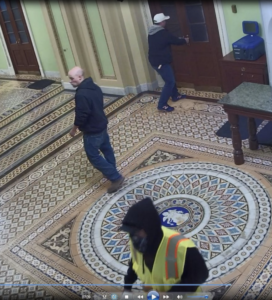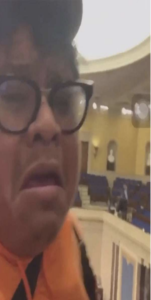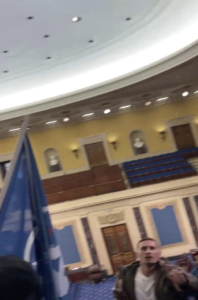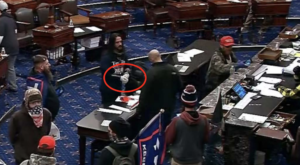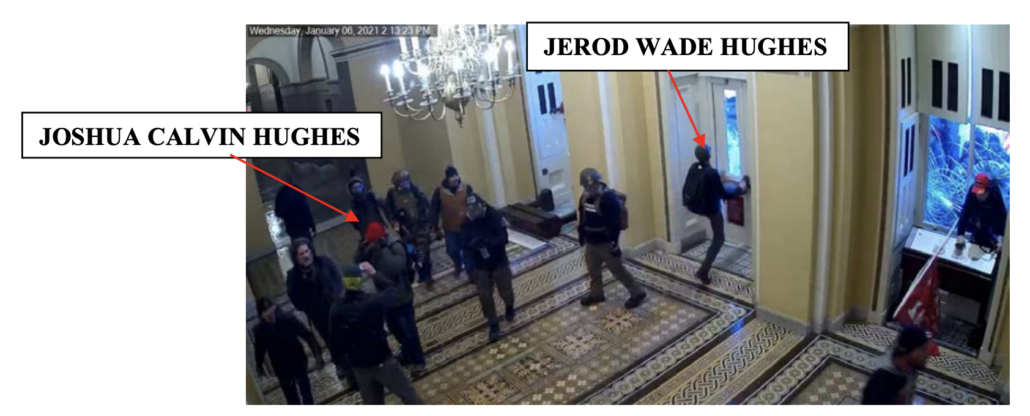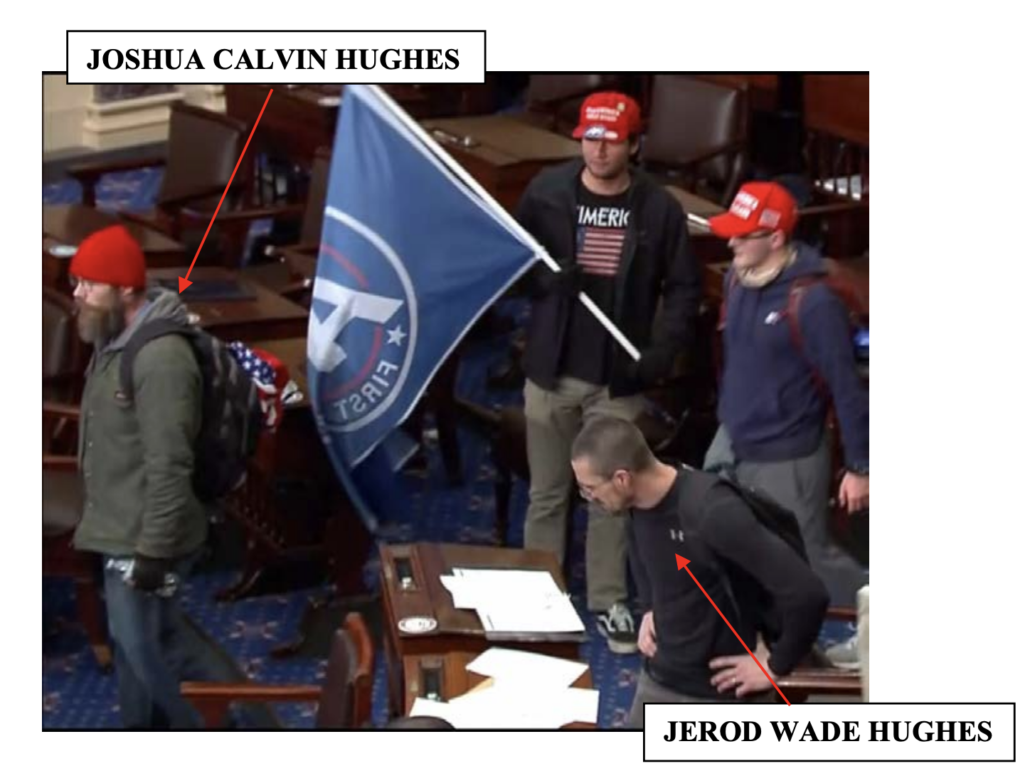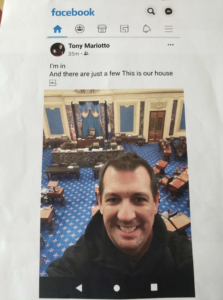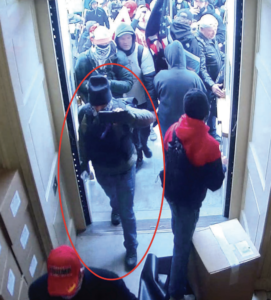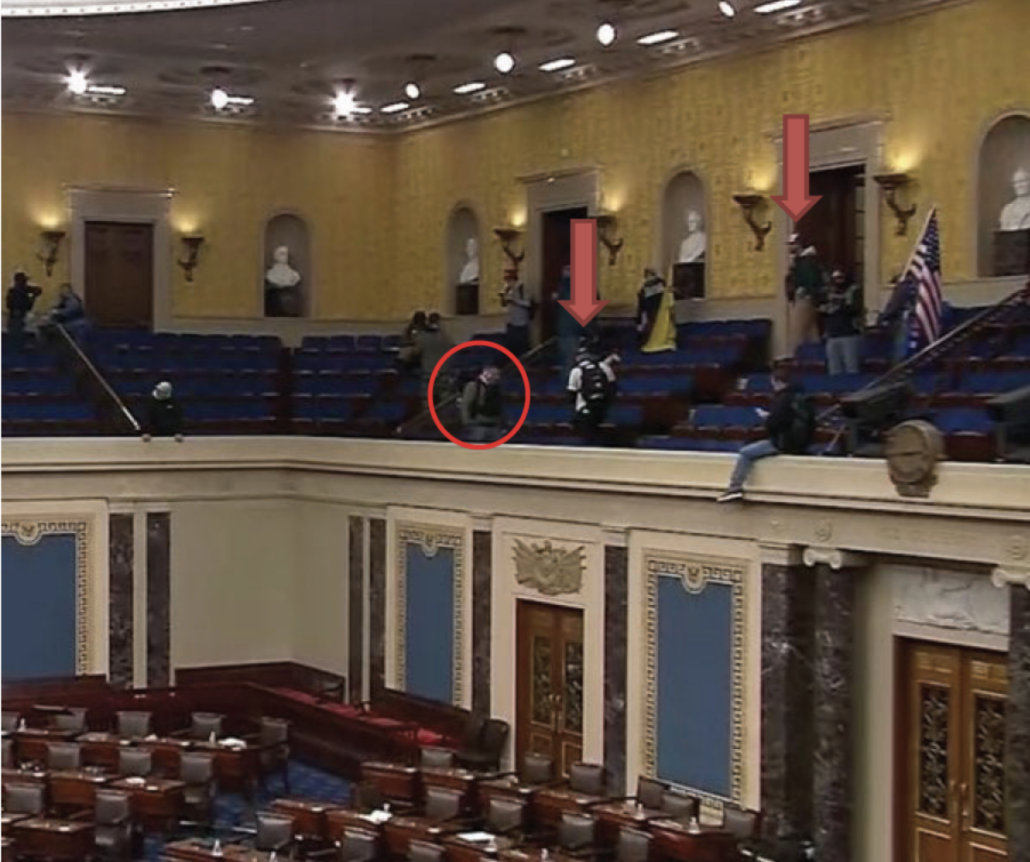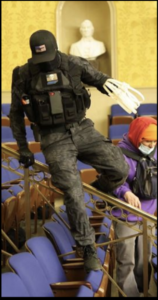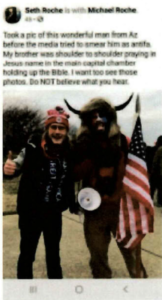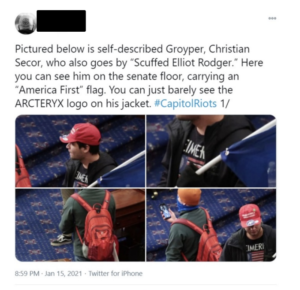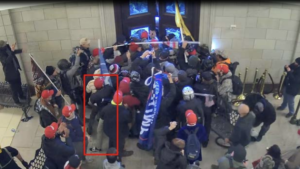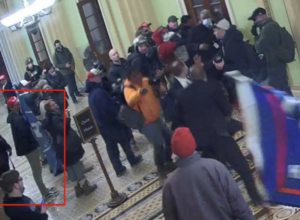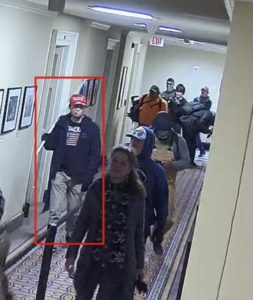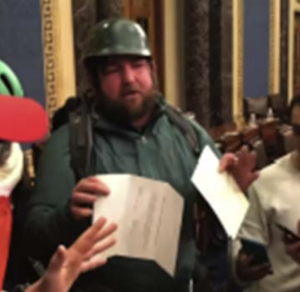The Crossroads of Insurrection: The Senate Chamber Insurrection Defendants
In a recent motion opposing relaxing Larry Brock’s release conditions, the government revealed that it, “is continuing to investigate the Defendant for the offense of obstruction under Title 18 United States Code Section 1512(c).” Brock is the retired Lieutenant Colonel who, like Eric Munchel, brought Zip Ties onto the Senate floor. In spite of Brock’s online writings shortly after the election predicting that, ““Fire and blood will be needed soon,” Brock was charged only with misdemeanor trespassing for his role in the insurrection.
Since then, the Senate has been a locus of increased attention, as the government arrests more people with video of what happened there and rounds up the co-conspirators of those they arrested months ago.
That increased attention provides a way to look at the events of January 6 via a different lens. Rather than focusing on the most spectacular defendants — no one is more spectacular than Jacob Chansley, but Eric Munchel’s actions attracted attention away from others — by focusing on who breached the Senate, we can understand some of the logistics that allowed it to be breached. And by whom.
The picture we get, as a result, is a crossroads of the really aggressive participants of the January 6 insurrection, with cultists, militia members, GOP operatives, and curious tourists all represented.
I am assuredly not saying there was or is a conspiracy that joins all these people. While there are some pregnant unanswered questions about individuals like Leo Bozell, Bradley Barnett, Jacob Clark, and Patrick Montgomery — as well as conduct like assaults charged against Montgomery and DJ Shalvey that remain undescribed — there’s absolutely no reason to believe this was all coordinated. … Beyond, of course, the President calling out the mob on Mike Pence.
A focus on the Senate is useful, though, to show how the multiple breaches interacted. The first people who came in the West door (including the Hughes brothers), the Northwest door (including Patrick Montgomery and his buddies), and the East door (which is how Joe Biggs got to the Senate), all made it to the Senate before it was secured. Indeed, a number of people who made it to the Senate (like Ronnie Sandlin) were instrumental in opening the East doors from inside, before they reached the Senate. So looking at who got to the Senate how helps to clarify how all the three main breaches worked in tandem, and in fairly quick succession.
It’s also a reality check about the relative importance of various groups who breached the Capitol. While this is still an impartial picture, the narrative to date suggests that QAnon managed to get far more of their adherents to the Senate floor than either the Proud Boys (Joe Biggs and Arthur Jackman showed up after getting in with the help of people inside) or the Oath Keepers (Kelly Meggs and Joshua James showed up too late). QAnon held a prayer on the dais while the militias were still breaching doors.
There are a number of people who remain — publicly at least — unidentified, such as two of Patrick Montgomery’s associates or someone who shadowed Bozell.
This post, a description of those who breached the Senate organized alphabetically by the most important participant, is just a baseline from which to understand more about who go to the Senate and how.
Update: In comments a few people have explained what significance I attribute to continuances a few of these defendants, like Leo Kelly, have. It means several things. First, it means the person in question is immediately moving to discuss a plea deal. One of the defense attorneys here seems to have chosen to really aggressively seek such continuances (Kira West is a noticed attorney on three of these defendants: Leo Kelly and Christine Priola, both of whom got continuances before being formally charged, and Tony Mariotto, who was charged by information; in the latter two cases, though, West sponsored outside attorneys Pro Hac Vice). But from a narrative perspective, it means our understanding of what the government knows about the defendant is frozen at the moment the FBI agent writes an arrest affidavit, whereas with defendants who get detained and then challenge that detention, which include a high percentage of the defendants who made it to the Senate, we often learn what the government found on the person’s cell phone. One of the points I attempted to make here is that for a variety of reasons, the story told in the court filings leaves out significant and, in some cases, intentional gaps in the revelation of what the government knows.
Note: This is based of my own imperfect list of who was described as being where. Plus, I suck at visual identifications. Please let me know what I’ve missed in comments.
Thomas Adams
Per his arrest affidavit, Thomas Adams traveled from Springfield, IL, and claims to have just followed the mob with an unnamed friend (probably Roy Franklin, who was interviewed along with him the day of the insurrection) up the scaffolding to what I believe is the Northwest door. The cops he saw after he entered the building “weren’t really doing much … just waiting to see if we’d try to push past them.” Soon thereafter, he entered the Senate, where he saw Jacob Chansley, who he thought was “hilarious.” This is a photo of Adams in the Senate.
Adams took a lot of video while he was in the Capitol, including footage from the Senate floor the government may be particularly interested in, including this image.
Adams was arrested on April 13, over three months after he appeared in an article describing his exploits that day, during a period when the government seemed to be arresting a lot of people who took a lot of video of key scenes. He was charged with trespassing and obstructing the vote count.
Tommy Allen
Tommy Allen flew to DC from Rocklin, CA. He was picked up on video recordings in the Senate from 3:03 to 3:10PM on January 6. In addition to this picture, he was filmed taking papers from the clerks’ desks at the front of the Senate and putting them in his back left pocket, as well as absconding with the American flag.
He would later tell a journalist he took a letter from Trump to Mitch McConnell from the then-Majority Leader’s desk.
Allen was arrested on January 22 after first a stranger and then someone who’d “interacted with him on a number of occasions” alerted the FBI to his Facebook posts, which he tried to delete after he returned home. The latter witness also told the FBI that he or she had heard that Allen had destroyed the documents he took in his backyard.
Allen was charged with trespassing and (probably misdemeanor) theft; after he was formally charged with the same charges on February 2, he wasn’t arraigned until April 8.
Bradley Bennett and Rosie Williams
At some point on January 6, QAnoner Bradley Bennett and his partner Rosie Williams seemed to pray with DJ Shalvey and two others.
And they appear to have gotten in the Capitol the same way that Andrew Griswold did (so probably the East entrance, after those doors were opened from inside). They also made it to the Senate.
Those images would seemingly expose the couple mostly to trespass charges — and indeed, that’s all Rosie got charged with, both on their arrest complaint and their indictment.
But from the start, Bennett responded to his pursuit with obstruction. First, per a tipster who had tracked Bennett for his QAnon postings, Bennett deleted most of his January 6 postings within a day of the event.
Publicly, on the day of the event, Bennett blamed Antifa instigators.
But Bennett texted an associate the same day and clarified that Jacob Chansley was not Antifa.
Bennett and Chansley now share an attorney, Albert Watkins.
Then, after the FBI arrived in Kerrville, TX on March 23 to arrest the couple based off a March 19 warrant, only Rosie was there to be arrested. Per a motion for detention, Bennett had left on March 13 (though one of his sisters claims they split up in February), rented a car, drove to North Carolina, then went to stay with a friend in Fort Mill, South Carolina for two weeks, then hid for another 10 days until finally agreeing to turn himself in on April 9. He stopped using his cell service in that time period and stopped posting to Facebook, shifting to Telegram instead. At some point, he got rid of his new iPhone 11, claiming it did not work (there’s still some uncertainty about when and why he ditched the phone).
Bennett’s efforts to evade arrest may well arise out of nothing more than QAnon paranoia. Though several other aspects about him suggest he may have a more sophisticated Q-related grift going on. But he had attracted attention, even among Q adherents, even before January 6, and he was among the most elusive defendants of all January 6 arrestees.
Joe Biggs and Arthur Jackman
That Joe Biggs made his way to the Senate chamber did not show up in his arrest affidavit, or the first several filings in his case. It was mentioned in the “Leadership indictment” charging Biggs and three others with a conspiracy to obstruct the election certification.
64. Thirty minutes after first entering the Capitol on the west side, BIGGS and two other members of the Proud boys, among others, forcibly re-entered the Capitol through the Columbus Doors on the east side of the Capitol, pushing past at least one law enforcement officer and entering the Capitol directly in front of a group of individuals affiliated with the Oath Keepers.
65. After re-entering the Capitol by force, BIGGS and another member of the Proud Boys traveled to the Senate chamber.
But that indictment, released on March 10, may have increased the urgency of the focus on the Senate, as it showed that Biggs entered the Capitol twice — first in the initial wave, through the West door, and then through the East door — in a kind of pincer movement and after doing so went to where Mike Pence had only recently been evacuated.
I’m not sure I’ve seen pictures of Biggs in the Senate. But the arrest affidavit for Arthur Jackman — with Paul Rae, one of two Floridians who tailed Biggs around that day — shows him, after twice being caught walking with his hand on Biggs’ shoulder…
… And posing with Biggs and Rae for a selfie on the East steps …
Jackman’s affidavit shows him in the Senate (where we know Biggs also went).
And taking this selfie with his Proud Boys emblazoned cell phone.
In fact, the investigation into Jackman (at least as described in the affidavit) started when a friend of Jackman’s shared that selfie — which Jackman had first sent to a childhood friend — with the FBI.
When interviewed by the FBI on January 19, a good two months before he was arrested, Jackman explained that he had joined the Proud Boys in 2016 as a way to support Trump, refused to say whether he had entered the Capitol, but claimed the Proud Boys weren’t there to infiltrate it as [this makes no sense] it was not a sanctioned Proud Boys event.
It’s going to be hard to argue he didn’t breach the Capitol as part of a Proud Boys’ event (twice!) when he did so each time tailing along behind Joe Biggs.
Joshua Black
Joshua Black claimed that God instructed him to drive to DC and take part in events on January 6, and he came with his knife. He was at the front of the mob pushing past barricades before the initial breach of the Capitol (though it’s not clear whether he was pushing himself or being pushed from behind), and after being hit in his face with a plastic bullet, he then walked around the Capitol and entered the East side, at the forefront of another mob. Then he found the Senate Chamber.
While there, he joined others in rifling through and photographing papers on the desks and then in prayer. He ordered someone else (maybe Christian Secor?) to get out of the presiding officer’s chair and not to be disrespectful, and ordered others not to loot the place.
He self reported after he showed up in media coverage, and then later admitted to the FBI he brought the knife that would significantly expand his legal exposure.
He was formally charged with obstruction, and the trespassing charges against him were enhanced because of that knife. He spent over three months in jail, in part because an Alabama Magistrate believed he might be dangerous if he came to believe God ordered him to commit violence. After a hearing on April 23, Amy Berman Jackson released him to home confinement.
Leo “Zeeker” Bozell
Someone whose kids went to school with Zeeker Bozell’s kids tipped of the FBI on January 14 that he had been part of the riot.
Then later, when CNN published footage from the New Yorker on the Senate rioters, that same tipster alerted the FBI to that, too, circling the scion of the movement conservative, Leo Bozell, in the picture.
After being interviewed by the FBI on January 19, the same very persistent witness followed up again on January 24 with this YouTube video that included a fleeting glimpse of Bozell, this time on the balcony in the Senate.
The clip itself is innocuous. But the crowd it captures on the balcony, possibly a convergence of the first people to arrive, may be far more important.
What may have finally piqued the FBI’s interest in the son of a prominent Republican operative were the videos showing that while Bozell was up on the balcony — before anyone was on the floor of the Senate — he and a much younger man (Mike P persuasively argues that this is Bruno Cua in comments) took steps to ensure that two cameras would not capture what was about to happen on the Senate floor.
Bozell was originally charged with trespassing and obstruction on February 11; he was arrested 6 days later. It wasn’t until his indictment on March 12 — two days after Joe Biggs was indicted in the “Leadership” indictment — that Bozell was charged with doing or abetting $1,000 of damage while forcibly entering the Capitol, the same charge used to detain some Proud Boys and Oath Keepers prior to trial. But in spite of being implicated in a crime of violence, Bozell was released on personal recognizance.
Larry Brock
Larry Brock is the less famous of the two Zip Tie Guys in the Senate that day, though Brock was even more kitted out than Eric Munchel. According to his arrest affidavit, within two days of the riot, Brock’s ex-wife called the FBI and told them he had been on the Senate floor. That same day, someone who knew of Brock’s Air Force background and ties to defense contractor L3 also tipped off the FBI.
Brock is one of the people (Oath Keepers Kelly Meggs and Joshua James were recently disclosed to be others) who also made it to Nancy Pelosi’s office, suggesting he was hunting top legislators. Yet, even though videos show Brock lecturing the other insurrectionists that, to win the I/O (information operation) war, they needed to avoid damaging anything, and even though Brock’s social media shows he had started talking war days after the election and mused that, “I really believe we are going to take back what they did on November 3,” while traveling to DC, the government only charged him with misdemeanor trespass (though as noted above, they’re still weighing obstruction charges for him).
Jacob Chansley
Jacob Chansley’s strutting poses have made him the poster child of the insurrection, but the self-billed “Q Shaman” was well know to those who tracked extremist organizing and QAnon before January 6.
As with Joshua Black, the FBI didn’t need to come looking for Chansley. He called them on January 7 and admitted he was the guy with animal pelts and no shirt.
Even though Chansley was originally charged on January 8 only with trespassing, an indictment obtained 3 days later charged him with obstruction and civil disorder. When Royce Lamberth denied Chansley’s bid for pre-trial release, he treated the spear Chansley had brought as a dangerous weapon, which will make his trespassing charges a felony as well.
Amid all the discussions about Chansley since he was arrested, one thing has gotten little public attention: his admission that he traveled to DC with some other people from Arizona, people who no doubt would implicate him in an extremist network that predated January 6. Unless I’ve missed it, that network hasn’t been implicated together.
Jacob Clark
The government got an arrest warrant for Jacob Clark by March 5. It appears to be based largely off using facial recognition to match his Colorado driver’s license to nine different pictures obtained from surveillance videos from the Capitol, corroborated by one person who knows him. They also used returns from the Google GeoFence warrant to show he was inside the Capitol from 2:15 until 3:25PM the day of the riot and returns from a Verizon warrant showing him driving from Colorado to DC from January 4 to 5 and then returning starting on January 7.
Because the government didn’t arrest Clark until April 21, over six weeks after obtaining the warrant, the warrant affidavit surely only shows a fraction of what the government knows about him. Even still, the affidavit shows Clark to have been like Where’s Waldo during the time he was in the Capitol, with surveillance footage showing him in four different confrontations with police in four different locations, each time seemingly pushing the cops to let rioters run through the building. The most easily identifiable (though he was also in the Rotunda as it was breached) shows that Clark took part in the exchange with plain clothes police outside the Senate gallery that Nate DeGrave was also charged for.
What’s interesting is the video shows that Clark got to that hallway over a minute before almost everyone else.
Clark was charged with civil disorder, obstruction, and trespassing, but perhaps because he was only recently arrested, he has not yet been indicted.
Josiah Colt, Ronnie Sandlin, and Nick DeGrave
I described here how these three men planned and outfitted for the insurrection together. The key takeaway from that post for the purpose of this one is that Sandlin and DeGrave are accused of tussling with cops so as to permit the East door of the Capitol to be opened (through which some key conspirators rushed), but also of fighting with cops just outside the Senate Chamber (along with Jacob Clark, above, and with Christian Secor watching) so as to permit the Chamber itself to be breached.
Only Josiah Colt is recognizable among these three, but his two buddies played pretty key roles in the success of the larger insurrection.
Elias Costianes
The FBI received a tip on January 8 that Elias Costianes had posted videos of his participation in the riot on his Snapchat account. On January 19, the tipster provided the videos he uploaded. Those showed Costianes filming himself in the Senate, outside Pelosi’s office, and possibly watching the East doors being breached. He was charged on February 3 with trespassing and obstruction and arrested on February 12. He was indicted on the same charges on March 3, and his case has been continued since, meaning there’s no explanation for why he knew precisely where to go in the Capitol.
Bruno Cua
Cua, a spoiled 18-year old whose own parents enabled his participation in the insurrection, was part of the mob that fought to get into the Senate Chamber (along with Sandlin, DeGrave, and Clark). According to his arrest affidavit, he was turned in by local police officers, who knew him because he has a history of pissing off his neighbors and ignoring orders. He was charged on January 29, arrested on February 5, and indicted on February 10. He was charged with obstruction, civil disorder, and assault/resisting, and his trespass charges were enhanced because he carried a baton with him. Even after the insurrection, Cua still endorsed violence.
Violent protests against the capital (NOT SMALL BUSINESS’S) are well within our constitutional rights
Dear Swamp Rats, The events at the capital were a reminder that WE THE PEOPLE are in charge of this country and that you work for us. There will be no ‘warning shot’ next time.
Everyone who works in congress is a traitor to the people and deserves a public execution.
But beyond details from his social media posts, there was nothing from an extended detention fight that illuminated more about Cua’s ties.
Andrew Griswold
For all we can tell from the court filings, Andrew Griswold is just some guy who went to the Senate floor along with a bunch of other people who wanted to prevent the vote count.
But there are a few interesting features of his case. Someone else who went to the Senate helped get Griswold, from Niceville, Florida, arrested. His Febuary 26 arrest affidavit, describing how he was one of the first people to come through what must be the East door after it was opened with the help of Sandlin and DeGrave, relies, in part on,
camera footage obtained from an individual (W-2) who also entered the Capitol on January 6. At multiple points during the video, an individual who appears to be GRISWOLD is visible, wearing a camouflage jacket.
[snip]
At one point in the video, W-2 walks through a hallway, and GRISWOLD is visible ahead. W-2 then enters the Senate gallery, and GRISWOLD is again visible, as seen in the screenshot below:
The discovery shared with Griswold may describe this as, “One clip from a video obtained in another investigation” which the government deems as Sensitive.
Magistrate Michael Harvey approved Griswold’s arrest warrant on February 26. But the first arrest warrant against him was quashed by Harvey, apparently on March 1; the arrest warrant that Harvey approved is also dated March 1. Griswold was arrested on March 5 and that same day he and his attorney stipulated to the fidelity of the FBI image of his phone so he could get it returned, which is a reasonable thing to do if you want to avoid buying a new phone but very rare among January 6 defendants (indeed, Vitaly Gossjankowski won’t so stipulate with his laptop, even though that has expensive software on it to assist his hearing disability). Griswold was charged with trespassing and obstruction, but almost two months after his arrest, he has not been formally indicted.
Apparently as part of Griswold’s efforts to get the DC pretrial release conditions imposed rather than the local FL ones (the conditions differ in terms of the travel restrictions, the reporting requirements, restrictions on alcohol and other drugs, and — most notably — restrictions on the right to retain a legal firearm), the original Florida judge in his case recused and another granted Griswold’s request. All subsequent January 6 defendants seem to be having restrictions imposed on gun ownership, so that may have been the issue.
Paul Hodgkins
In an interview on January 26, four days after an acquaintance provided the FBI with a selfie he posted to Parler, Paul Hodgkins told the FBI that he traveled to DC alone, on a bus, and didn’t know any of the people engaged in violence or destruction around him. But before he started rifling through things on the desks in the Senate, he put on some white latex gloves, which is a curious bit of preparation for a guy who just hopped on a bus alone.
Hodgkins’ release conditions — initially, with a $25,000 bond and high intensity supervision, though with the bond later dropped by Magistrate Merriweather and then his curfew loosened by Judge Randolph Moss — were much stricter than other defendants charged, like he was on March 5, with trespassing and obstruction. (That could either stem from a strict local magistrate or from a prior arrest record.) In both of Hodgkins’ appearances, his lawyers have talked about making a plea deal.
Jerod and Joshua Hughes
Jerod and Joshua Hughes are brothers from Montana. They watched as Dominick Pezzola busted through a window to break into the Capitol, were among the first 10 people in (amid a group that included Proud Boys who — like them — are from Montana), then Jerod kicked the door open to allow other rioters in behind them.
They went from there immediately towards the Senate floor, following Officer Goodman closely behind Doug Jensen.
Once inside the Senate, Jerod set about ransacking desks as Christian Secor, holding his America First sign, looked on.
That’s about all their arrest warrant, charging them with civil disorder, damaging government property, obstruction, and trespassing describes. They turned themselves in on January 11 after the FBI released their pictures on a BOLO. They were indicted on February 10. Since that time first Jerod, then Joshua, have moved for bond, which Judge Tim Kelly granted to both on April 7.
Those detention disputes, revealed that the brothers had driven over days to attend Trump’s rally. They claimed, at first, that they had gone to the Capitol in response to Trump’s exhortations. But after the prosecutor reviewed the Cellebrite report from Jerod’s phone on April 5, the government discovered texts showing buddies had funded the trip, and that Jerod claimed that he was behaving as a model citizen by participating in an insurrection.
Defendant: Ah we didn’t do anything crazy like destroy shit or fight the cops. Trespass and vandalism. Meh. I’ve done time. It’s josh I worry about.
Person Five: It’s the trespassing I worry about, but there may have been so many of you that figuring it out is more trouble than it’s worth. Were you in the photos? I could only see josh
Defendant: They got my ugly mug up and down. Trespassing ain’t shit. I feel like I was behaving like a model citizen ready to reclaim my country. Not enuff people followed.
Jerod said to someone else that they had wanted to hold the place but didn’t have numbers to accomplish that.
Person Six: How was it
Defendant: Insane on a few different levels.
Defendant: I saw picture [sic] of me and josh already on the news. Not enough people followed us in to hold the place. We had to get the fuck out.
The government also noted — attributing it to a picture on Jerod’s phone though they surely would have had it before — that the two had been present in the Senate Gallery, as well as the Senate floor.
Leo Christopher Kelly
Leo Kelly did an interview the day of the riot — after being among the first people in the Capitol and praying with others on the dais of the Senate — expressing some reservations about invading other people’s space. He asked a Deputy US Marshal to tell the FBI he would turn himself in if an arrest warrant were issued. He was arrested, just on trespassing charges, days later. Since that time, the government has twice deferred formally charging him, with the next deadline for a preliminary hearing set for May 10.
Anthony Mariotto
Like fellow Floridian, Arthur Jackman, Tony Mariotto was first IDed after he shared a selfie from the Senate Gallery and a friend shared it (after Mariotto had deleted his Facebook account) with the FBI.
Mariotto was in Georgia when the FBI first caught up with him. But when they asked, he immediately returned to Florida, and, on January 19, handed over his phone to be imaged. Three days later he was arrested. On February 8, he was formally charged with trespassing.
His arrest affidavit, which describes, “other videos that were recorded inside the Capitol Building during the events of January 6, 2021,” doesn’t describe what was on those videos. They may be among those that implicate others who entered the Senate.
Patrick Montgomery and Brady Knowlton
The investigation of Patrick Montgomery is a useful snapshot for understanding the Senate as a crossroads. As I wrote here, his acquaintances started turning him into the FBI the day after the insurrection, leading to his arrest and formal charge on misdemeanor trespassing charges by information. Even while that was happening, the FBI was investigating a guy who showed up in one of his pictures from the day, Brady Knowlton.
Knowlton’s arrest affidavit implicated two other guys, one that a witness who has been in a lawsuit with Knowlton for years described as Knowlton’s “right-hand man,” but who remains unnamed and uncharged. And surveillance images of Knowlton and Montgomery IDed someone — the guy in the hoodie who entered the Capitol with Knowlton and Montgomery — whom FBI either declined to name or had not yet IDed when they got the Knowlton arrest warrant.
The three of them went to the Rotunda — where people were opening a third breach to the Capitol — and from there to the Senate, with Knowlton filming from his camera the entire time.
When the government indicted Montgomery and Knowlton on April 16, they not only charged both with obstruction, but they added assault and civil disorder charges against Montgomery for an unidentified exchange with cops.
So in addition to the assault that Montgomery allegedly was involved in, this thread still leaves two men unidentified.
Christopher Moynihan
Per his arrest affidavit, Christopher Moynihan is another of the people who rifled through official papers when he got to the floor of the Senate on January 6. g “There’s got to be something we can use against these fucking scumbags,” he was quoted as saying. In the wake of the New Yorker video, two of Moynihan’s former co-workers alerted the FBI to his identity. He joined the prayer on the dais, but with a sour face that made it look like he was just going along. He was arrested on February 25 and indicted with the same obstruction and trespassing charges on March 17.
Eric Munchel and Lisa Eisenhart
Eric Munchel and his mom, Lisa Eisenhart, quickly became the focus of both legal and press attention given his spectacular appearance on the floor of the Senate with Zip Ties.
They were arrested early — on January 15. Munchel’s admission to having a taser when he breached the Capitol increased both’s legal exposure under a deadly weapon enhancement. But Munchel’s general compliance with law enforcement also helped to convince the DC Circuit they would not be a threat going forward.
After the events of January 6, Munchel apparently considered joining Proud Boys. But instead, he’s now the poster child both for the threat of kidnapping, but also for a DC Circuit standard of bail that treats involvement in a terrorist event as a historical threat, and requires detention decisions to consider whether the same people pose a forward-looking terrorist threat.
The more important point for the purposes of this post is that the government has not yet shown proof that Munchel or his mother did more than recognize the two militias as they were engaged in armed MAGA tourism while holding zip ties.
Christine Priola
According to her arrest affidavit, the government identified Christine Priola’s presence in the Senate chamber within days, based in part on the sign she carried reading, “The Children Cry Out for Justice,” perhaps suggesting a QAnon affiliation. Curiously, the affidavit explains that she and others — the first people in the Senate — “entered the restricted floor area of the Senate chambers and took photographs of the evacuation of the Senate chambers that were required based on the unauthorized entrance,” suggesting the rioters arrived even earlier than the impeachment case had made out.
After a tip on January 8 from someone in Cleveland that Priola, who worked for the Cleveland School District, was the one holding the sign, the FBI searched her home and seized her devices — on which she had filmed events in the Senate — that same day. But when the FBI imaged her phone, there were no photos, videos, chats, or messages from January 4 through 7, and the location of the phone was also unavailable until 4:23PM on January 6, when her phone showed up northeast of the Capitol.
Priola was arrested for trespassing on January 14, but since then her case has been on hold, without even an Information to show whether the FBI obtained more information on why her phone had been cleared within two days.
Michael Roche
Michael Roche is one of the people who joined Jacob Chansley in prayer on the Senate dais. The story of how he came to be arrested — and why he was not arrested until April 13 — remains a muddle. He was IDed on February 8 when law enforcement found a video he made posted to someone else’s account. In the video, he admitted that,
We did get a chance to storm the Capitol. And we made it into the chamber. . . . We managed to convince the cops to let us through. They listened to reason. And when we got into the chamber … we all started praying and shouting in the name of Jesus Christ, and inviting Christ back into out state [sic] capitol.
That seems to have led the FBI to this photo was posted by Seth Roche, explaining that he took the picture before people started claiming that Jacob Chansley was Antifa and explaining (I think) that his brother had stood shoulder to shoulder in prayer with Chansley, “in the main capital [sic] chamber [sic] holding up the Bible.”
Roche’s arrest affidavit suggests the FBI found both those posts before the New Yorker posted its story on January 17 with the video of Chansley, Roche, and others praying.
According to the arrest affidavit, nothing else happened until US Marshals, in an effort to find a missing child, knocked on Roche’s door, thinking the child’s family lived there. Roche told the Marshals he thought they were coming to arrest him. When the Marshals informed the FBI that same day, the FBI got the Marshal to ID Roche as the person in the NYer.
Again, all that happened by February 2. It wasn’t until April 7 when the FBI submitted his arrest affidavit. The affidavit not only has no more recent evidence in it, but it doesn’t really explain why Roche (unlike — say — Larry Brock) got charged with obstruction along with trespassing.
Those questions further raise the question about whose Facebook his interview appeared on, because that person may be the real person of interest associated with Roche.
Christian Secor
It seems like Christian Secor’s classmates at UCLA jumped on the opportunity to report Secor’s involvement in the January 6 insurrection. Eleven people, many of them students, IDed Secor as one of the people who had sat in the presiding officer’s seat or otherwise shown up in the New Yorker video of the Senate occupation.
But Secor did more than tour the Senate. The surveillance videos the FBI included with his arrest affidavit show Secor was among those who shoved the East doors open from inside.
He was close to the brawl outside the Senate gallery doors involving Nate DeGrave, Ronnie Sandlin, and Jacob Clark.
There’s even a clip of him just behind the woman that the FBI suspects of having Nancy Pelosi’s laptop (per a Homer, AK woman who claims she was mistakenly IDed as such).
There’s no reason to believe Secor and this woman are together, but the proximity is interesting given that Riley June Williams, also a Groyper, allegedly first took the laptop.
Secor was arrested on suspicion of assault, civil disorder, obstruction, and trespassing on February 16 and indicted on those same charges on February 26. In March his lawyer moved to get him released in time to finish his UCLA finals. The government tried to oppose his release, pointing in part to his pro-fascist views, in part to the weapons he had been acquiring and in part to his alleged attempts to cover up his involvement. But Judge Trevor McFadden released him on a $200,000 bail with a rather curious kind of home incarceration that lets him out to work.
DJ Shalvey
DJ Shalvey is the guy wearing an undersized hard hat depicted in videos of people rifling through papers in the Senate. He’s quoted thinking Ted Cruz sold them out before others tell him, no, Ted Cruz was right there with the insurrectionists.
The FBI obtained an arrest warrant for him after two long-time associates alerted the FBI, one of whom shared selfies that Shalvey sent him the day of the riot, by February 12. But he wasn’t arrested until March 9, reportedly after turning himself in. Somewhere along the way he must have interviewed with the FBI, though, because his (still undocketed) indictment released Friday not only added assault and civil disorder charges against him, as well as theft charges for taking a letter from Mitt Romney to Mike Pence, but they also made Shalvey the rare if not only January 6 defendant charged with lying to the FBI about that assault.
